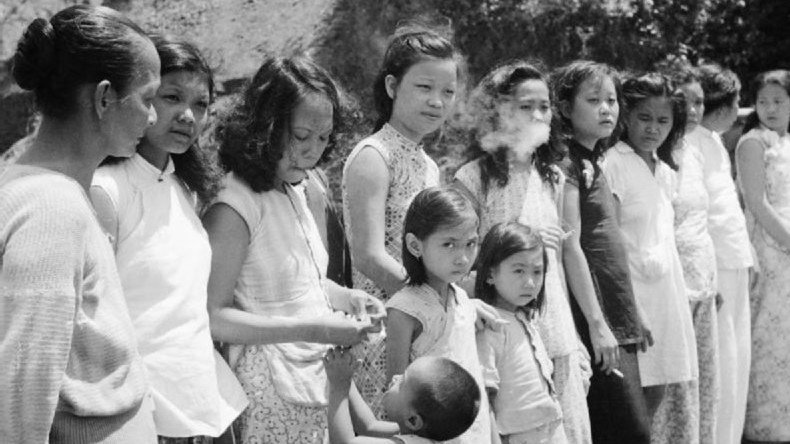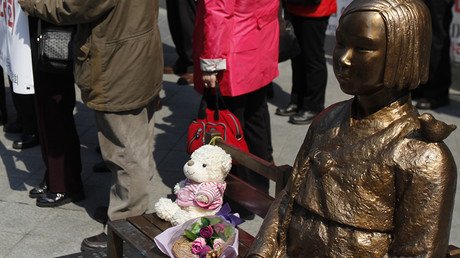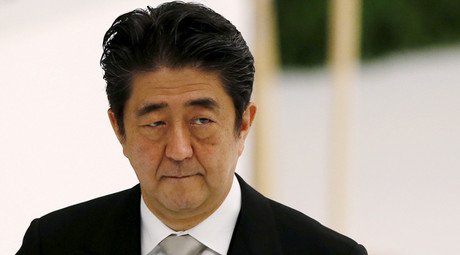Japan denies forced sex slavery WWII to UN, despite signing landmark deal with S. Korea

Japan has officially stated to the UN that it did not force Asian women to become sex slaves during World War II. This comes despite the Japanese government signing a landmark deal with South Korea, settling the issue of "comfort women" a month ago.
Tokyo was asked to provide written answers to questions put forward by the UN Committee on the Elimination of Discrimination against Women. The Japanese government stated that there was no evidence that the women were forced into sexual slavery as it sent the reply ahead of the organization’s planned committee meeting, which starts February 15 in Geneva.
"The government of Japan has conducted a full-scale fact-finding study on the comfort women issue since the early 1990s when the issue started to be taken up as a political issue between Japan and the Republic of Korea," the Japanese statement said, as cited by the Yonhap News Agency.
The Japanese authorities said they conducted a study into the issue, which looked at documents from various Japanese government agencies. They also spoke to relevant individuals and former military figures.
"Forceful taking away of comfort women by the military and government authorities could not be confirmed in any of the documents," it said.
The claims led to a damning response from South Korea for its continued denials regarding its coercion of Korean women into sexual slavery.
"Seoul should officially rebuke this argument and discuss the issue from square one as Japan has broken the deal," said Yoon Mi-hyang, head of the Korean Council for Women Drafted for Military Sexual Slavery by Japan, a non-government organization for the victims, according to the Korean Times.
Japan’s Foreign Minister Fumio Kishida said on January 18 that the term “comfort women” should not be used to describe “sex slaves.”
“The term ‘sex slaves’ doesn’t match the facts, and (the Japanese government) believes it should not be used,” Kishida stated, as cited by the Japan Times.
Kishida also said the South Korean government has confirmed that the formal term used by Seoul is “victims of the comfort women issue of the Japanese military,” not “sex slaves.”
It had seemed in December that Japan was finally ready to concede that it was ready to apologize for the enslaving of tens of thousands of ‘comfort women’ from South Korea.
The agreement on December 28 between South Korea and Japan was considered a landmark deal and concerns decades of animosity because of the failure to agree that Korean women were forced into sex slavery run by the Japanese empire for soldiers.
Under the deal, Japan said it would pay one billion yen (about $8.3 million) in compensation.
"The comfort women issue... occurred with the involvement of the Japanese military... and the Japanese government acutely feels its responsibility," Kishida said, according to Channel News Asia. He added that Prime Minister Shinzo Abe has expressed an “apology and repentance from the bottom of his heart” to those affected by the tragedy.
However, following Sunday’s comments by the Japanese government, the Korean authorities are now questioning whether the December agreement was sincere.
"The Korean government should respond to the undermining of the agreement sternly," Kim Yeol-su, an international politics professor at Sungshin Women's University said, according to the Korean Times. "It reflects that Japan did not engage in the deal sincerely in the first place."
Meanwhile, the Korean Foreign Ministry says it is considering countermeasures following the Japanese declaration.
"As there was no exact wording on coercion in the deal, it is not a matter of breaking the accord," Cho June-hyuck, the Foreign Ministry spokesman said. "But we are mulling over how to respond to such a move since we are taking it as an official position of the Japanese government."














